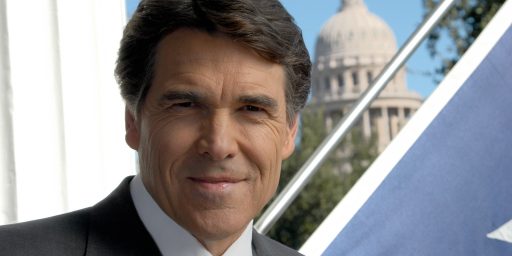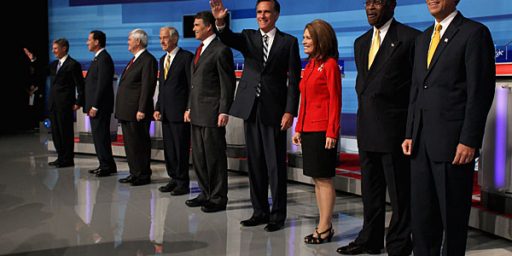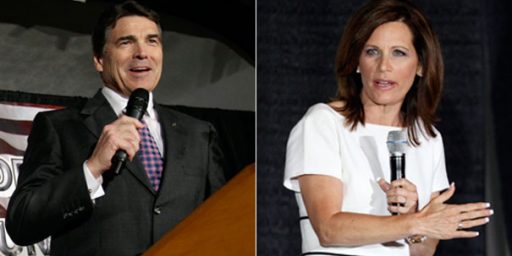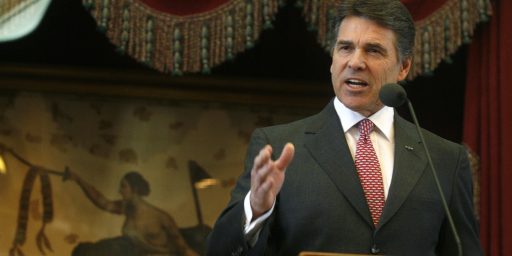Religious Extremism in America
What are the contours of "mainstream" religious thought in today's America?
Earlier this morning, Andrew Exum passed on what he termed “A simply outstanding op-ed by Ross Douthat.” An interesting two-hour Twitter back-and-forth ensued.
Douthat’s column, “American Theocracy Revisited,” is a push-back against an emerging elite consensus on religiosity in American politics.
[W]ith the rise of first Michele Bachmann and then Rick Perry in the presidential polls, and the belated liberal realization that many Tea Partiers are also evangelical Christians, the fear of theocracy has suddenly returned. Beginning with Ryan Lizza’s profile of Bachmann in The New Yorker, a spate of recent articles have linked the Republican presidential candidates to scary-sounding political theologies like “Dominionism” and “Christian Reconstructionism,” and used these links to suggest that Christian extremism is once more on the march.
[…]
[T]here are four points that journalists should always keep in mind when they ask and then write about religious beliefs that they themselves don’t share.
First, conservative Christianity is a large and complicated world, and like other such worlds — the realm of the secular intelligentsia very much included — it has various centers and various fringes, which overlap in complicated ways. Sometimes teasing out these connections tells us something meaningful and interesting. But it’s easy to succumb to a paranoid six-degrees-of-separation game, in which the most radical figure in a particular community is always the most important one, or the most extreme passage in a particular writer’s work always defines his real-world influence.
Second, journalists should avoid double standards. If you roll your eyes when conservatives trumpet Barack Obama’s links to Chicago socialists and academic radicals, you probably shouldn’t leap to the conclusion that Bachmann’s more outré law school influences prove she’s a budding Torquemada. If you didn’t spend the Jeremiah Wright controversy searching works of black liberation theology for inflammatory evidence of what Obama “really” believed, you probably shouldn’t obsess over the supposed links between Rick Perry and R. J. Rushdoony, the Christian Reconstructionist guru.
Third, journalists should resist the temptation to apply the language of conspiracy to groups and causes that they find unfamiliar or extreme. Republican politicians are often accused of using religious “code words” and “dog whistles,” for instance, when all they’re doing is employing the everyday language of an America that’s more biblically literate than the national press corps. Likewise, what often gets described as religious-right “infiltration” of government usually just amounts to conservative Christians’ using the normal mechanisms of democratic politics to oust politicians whom they disagree with, or to fight back against laws that they don’t like.
Finally, journalists should remember that Republican politicians have usually been far more adept at mobilizing their religious constituents than those constituents have been at claiming any sort of political “dominion.”
There’s more to the piece, which I commend in its entirety, but that’s the gist. My response to Exum was that, while I agree with his larger point, “Douthat plays sleight-of-hand on Bachmann, who is genuinely a religious extremist. Vast majority of her followers aren’t.”
This spawned a multi-way debate with Exum, Josh Treviño, Jeff Emanuel, Joshua Foust, John Hawkins, and others that centered on two related questions. First, how should one apply the term “extremist” in the context of the American religious debate? Second, what are the contours of “mainstream” religious thought in America?
On the first, I agree with Exum and Emanuel that we need to be careful in the use of the word in this context. As I concede, “extremist” means something entirely different in the context of American Christianity, in which there is essentially no movement that condones violence against non-adherents, than it does with talking about Islam, which does. While “Christianist,” “American Taliban,” or “Shi’ite Baptists” are provocative or amusing rhetoric, they’re meaningful only in the sense that “Fascist” or even “socialist” are in the American context.
On the second, it’s hard for non-believers, especially those who live in metropolitan areas surrounded by a very secular culture, to understand how truly mainstream some beliefs many of us consider wildly absurd are. Foust points me to the Christian Nightmares tumblr, which collects a lot of videos, bumper stickers, and the like. Having spent much of my life in the rural South, much of it (including the minivan whose photo adorns the top of this post) strikes me as perfectly normal. But Pat Robertson, much less Damon Thompson and Darlene Bishop, just strike me as nuts. Their followings, however, are not insignificant.
I consider Bachmann extreme because, among other reasons, she and her husband Marcus run a clinic that purports to help homosexuals “cure” themselves of their “affliction.” While I’m well aware that large number of people think such a thing is possible, it’s so wildly bizarre that it can’t possibly be considered mainstream.
One of the things that distinguishes Christianity, especially the American variants, from the brand of Islam practiced in much of the Middle East and North Africa, is that it constantly evolves with the social and political culture. Beliefs that were perfectly mainstream half a century ago–much less centuries ago–have been adapted if not outright rejected to comport with the social realities of the times. While this may be theologically dubious, it strikes me as perfectly reasonable given that Christianity seeks to help people live better lives and that this is only possible if the church can appeal to modern believers.
Offhand, I’d consider Bachmann outside the “mainstream” tent and, from what I’ve gathered thus far, Rick Perry just inside it. But I’m not at all sure that I’m right about that.







I guess it depends on how you define mainstream. Nearly three-quarters of all Christians in the U. S. are what I’d characterize as “orthodox Christians” (Catholics, Orthodox, Episcopalians, Lutherans). Roman Catholics alone account for more than half of all Christians here.
BTW, perhaps John Burgess can chime in on this but I think you’re overstating the rigidity and uniformity of Islam. And I think that’s a view that’s fostered by the most extreme elements in Islam.
My impression is that local variations are extremely diverse in Islam, much more so than in Christianity, and that new, subtly different versions are springing up all of the time.
I think Kevin Phillips charted a good history. Before mass media, city Christians were traditional Catholics and protestants. The evangelicals were stronger in the countryside, but below the city radar. Radio and television brought televangelism, coinciding with a great wave of migration from country to cities.
It would all be fine with me, if the country religions didn’t have that country distrust of intellectual disciplines, including science. The evangelical wave was was also an anti-intellectual wave. That’s harsh, but true.
We have a mega church in the area. Some have reckoned it the world’s largest single congregation. Members doubt old earths, evolution, and global warming. Why? Because it is all a bundle. And you shouldn’t really believe those city-slickers.
So what you believes makes her extreme, her husband’s counseling practice, isn’t really about her or her political positions. No doubt such counseling is controversial, and reflects values that most Americans don’t share. To me a religious extremist is someone who believes that only their religious group is fit to hold political office (dominionism).
@john personna:
Something similar has happened in Islam over the last 50 or so years. See the lengthy quote from Ernest Gellner here. One of the things that has happened is that formerly isolated, largely rural preachers have moved into the cities.
(What Phillips argued in his book, American Theocracy, is that the evangelical value set has become much more mainstream, and with GWB won a presidency.)
@Dave Schuler:
That would make sense.
@PD Shaw:
By that measure, we are a dominionism. Remember this poll? A generic atheist loses.
[or should it be “dominiony”]
I don’t believe for a second in the danger of Theocracy in America but I am more and more irritated by religious phraseology and references used, on both sides of the aisle, in political discourse and the underlying very common view that America has some sort of special relationship with God.
It’s not healthy, including the “God bless America” we seem addicted to. (I can’t imagine Angela Merkel or Nicolas Sarkozy ending a speech with such a closing statement.)
The founding documents of this country are the Constitution and the Federalist papers, and its motto is *E Pluribus Unum”. Not the Bible and “In God we Trust” respectively.
I thank Dave Schuler for the invitation. I also agree with him that Islam is not as rigid, on the whole, as the post would suggest.
There are very rigid strains within Islam; there’s no doubt about that. Salafism, whether Saudi or Deobandi or other, are sticklers and textualists. They will go for the narrowest possible interpretation of the Quran or hadith… at least in areas where it suits them. They, as did Sayyed Qutb, tend to place their arguments on top of an anti-colonialist interpretation of history.
These groups, however ascendent they may happen to be, are not the ‘mainstream’ of Islam, even in the countries in which they predominate. Most Muslims, in my experience, tend to be looser in their behaviors and beliefs, adopting a more live-and-let-live attitude. At least until they’re challenged by those calling them ‘bad Muslims’. The fear of being seen as a bad Muslim, I think, is one of the forces within conservative Islam that pushes toward extremism. It is such a problem that even the Saudi government has cracked down on takfiriism, that is, making claims that so-and-so is no longer a Muslim because his beliefs/actions are heterodox. A sinner he may be, but a Muslim he remains.
Islam as practiced by the majority is more concerned with rules on how to live daily life without committing too many sins along the way. Mainstream Muslims are far more concerned with putting food on the table, getting their kids educated, into jobs, and married than with the exact parsing of some text. There are myriad things they don’t understand, but they don’t spend a lot of time trying to figure them out, either. If their kids’ school is teaching Evolution, and zealots are decrying it, they’ll mostly go along with the school. They, like most people, can deal with contradictions by not spending a lot of effort in trying to resolve them.
BTW, that vehicle would be pulled over for ‘Obstructed View’ here in Florida. And most other places, I’d think. A content-neutral, public safety concern whose enforcement would pass First Amendment muster.
For one evangelical’s take on the modern movement and its discontents, see Fred Clark, Witnessing tools and resentment.
and
Thanx James, I needed a good laugh (tho not a reminder of what a hypocrite Douthat is).
Oh, and I have on it good authority, the Reverendness Bachmann, that the recent earthquake and hurricane is just God pulling our coats about the deficit…
@PD Shaw:
That may well describe Bachmann, who at the least has been influenced by Dominionist thinkers, per her recent profiles.
I think its amusing that the strongest defense Douthat can make for the Christian Rightist politicos is “don’t worry, we are just conning the rubes”.
In many cases (Reagan) that may be true- but even then, at some point the rubes take power and actually want to enact the agenda they have been promised.
@john personna: (What Phillips argued in his book, American Theocracy, is that the evangelical value set has become much more mainstream, and with GWB won a presidency.)
And yet, after eight years, we didn’t seem any closer to a theocracy than we did before. Why, it’s almost as if there are hefty Constitutional provisions against it, and enough Americans resistant to it…
J.
@John Burgess:
I think that’s a pretty good description of mainstream Christians, too.
@Maxwell James: I did not think much of the New Yorker piece claiming she was a dominionist. Background But its an easy question to resolve; ask her if she is President if she will only appoint Christians to office?
@Jay Tea:
It’s possible that [GWB] was more a pinnacle than a harbinger. Though, it might hang a bit in this election. If Perry wins the nomination because he is the right kind of Christian, then that much theocracy remains. And of course then it would be tested in the national elections.
My sense is that the Tea Party isn’t as dead as I thought it was, and that they are going to take a theocratic run at it.
@PD Shaw:
That’s too high a bar. You only have to ask her if she’d prefer Christians.
(An administration with “token non-Christians” would be pretty scary.)
@Dave Schuler: Funny, isn’t it?
I hope I’m misunderstanding you. Certainly you aren’t implying that something bizarre can’t be mainstream- cause there’s all kinds of alien abduction, crystals as medicine, and so on that is definitively mainstream (as in believed by a sizable portion of the population, the only objective measure of “mainstream” I can think of) but also patently absurd.
Christianity is itself ridiculous (as are Judaism and Islam) and yet has been undeniably mainstream for much of the world for millennia now.
No need to discuss their primitive superstitions, most Republicans now embrace far more silly things like “Tax cuts increase government revenue.”
@Murray:
What … no love for the Anti-Federalist papers? sure they didn’t get the headlines but they are very impotent for understanding the context of the constitutional debate and crucial for understanding the rational for subsequent amendments in the BoR’s.
@Tlaloc: I don’t think of alien abduction and the rest as “mainstream” beliefs. Most standard religiosity is about ethical precepts and psychological reassurance as much as it is about the mythology, much of which is silly upon minimal scrutiny.
@ponce: There’s not much question that tax cuts can lead to increased revenue to the Treasury. It was a pretty powerful argument when the top marginal rate was 90 percent or even 70 percent. It’s pretty silly when it’s 38 percent.
I grew up in the most fundamental of fundamentalist households. Jerry Falwell was considered a moderate, and my Dad left the John Birch society when it became too liberal. What people miss about people immersed in these cultures is the inability to compromise. Your ordinary, run of the mill conservative believes in lower taxes because he read Ayn Rand (and did not realize it was fiction) or read Hayek or learned it from friends/parents. The fundamentalist believes this because it comes from God. They really believe that they are doing God’s will (remember Ashcroft getting anointed with oil?).
This kind of religious belief also makes believers see others in black and white terms. Think about torture for a minute. Reagan, the conservative icon, signed an agreement to not torture. Yet, it was ignored, fueled mostly by those of fundamentalist Christian leanings (Baptists are high on the list supporting torture). If your religion leads you to believe that others are evil, and true fundamentalists tend to believe that other faiths, including mainstream faiths like Catholicism and Judaism, are cults, you can justify any behavior towards those people.
I think that we should remain deeply skeptical when people try to mix religion and politics. Religion never wins. If patriotism is the last refuge of the scoundrel, religion is the first resort of the bamboozler. W and Perry strike me as pols who are willing and able to use religion to win elections. Bachmann seems more like the true believer. God knows which is worse for us.
Steve
@steve: I see no evidence that Bachmann is a fundamentalist, but if that’s important to you then perhaps someone should ask her some questions about it.
As to torture, the Reagan/Bush administration supported the use of techniques like waterboarding (non-physical, but mental pressure) by drafting the law with this loophole in it. Blaming Christian fundamentalists for something that had widespread support in two Presidencies and Congress is not fair.
@PD- How many non-fundamentalists read Rushdoony, or even know who he is? How many non-fundamentalists go to Oral Roberts? How many non-fundamentalists try to cure gays? While none of these are proof positive, it does suggest she qualifies. Still, yours is a valid POV. Like most politicians, she may just be using faith as a way to garner votes, while her husband makes money off of it. That would be more in line for those running for office. Someone should ask her.
Steve
@steve:
Nigh on zero.
How many non-fundamentalists go to lib institutions of higher learning? Or should I say come out of? lol….
How many non-fundamentalists try to indoctrinate non gays? Including your kids?
lol “cure”, “affliction”. sigh….
You mean blaming CINOs, Christians In Name Only.
The same crowd that rabidly supports fringe right causes like Israel’s theft of Palestinian land,
@G.A.Phillips:
For years and years both conservatives and liberals could go to the established universities. The main (city) religions made their peace with those. Actually the city religions and the universities co-evolved.
The evangelicals were new to the mix, and discovered they weren’t compatible. So, they founded their own specialized schools. They are unique in that their goal is to teach *less* than their competition.
I’d prefer not to think of them that way either but nevertheless…
(for the record I’ve seen plenty of polling that suggests that about 1/3 people believe in aliens visiting the earth, that’s pretty damn common, easily enough so to qualify as mainstream)
Again what you describe is the way I’d like ti to be, not the way it seems to actually be. That’s not to say there aren’t plenty who try to get good moral guidance from religion while leaving the superstitious mummery behind, but there’s also lots who go the other way. There’s a reason we have amusement parks that show jesus with dinosaurs and so forth- there’s an audience for that idiocy.
@PD Shaw: The question isn’t what she says she will do, it is what she will actually do. For me, she is simply not a trustworthy person.